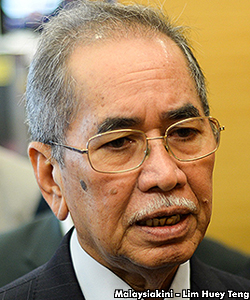The Pahang government will not shut down bauxite mining in the state just yet, despite high levels of metals including the very harmful mercury found in waters near Kuantan.
The state said it is still waiting for the Atomic Energy Licensing Board (AELB) findings on radiation, despite federal agency tests finding high concentration of mercury in Pantai Pengorak waters.
“Issues like loss of income for landowners, mining workers, including lorry drivers, needed to be considered, too,” Pahang Menteri Besar Adnan Yaakob told the New Straits Times.
The state earned at least RM37 million from the five percent royalties imposed on revenue from bauxite mining, he is quoted by the daily as saying.
The NST said levels of mercury found exceeded the lowest allowable levels according to water quality guidelines.
 However, Natural Resources and Environment Minister Wan Junaidi Tuanku Jaafar
(photo)
said the environmental impact outweights the financial gain.
However, Natural Resources and Environment Minister Wan Junaidi Tuanku Jaafar
(photo)
said the environmental impact outweights the financial gain.
The federal government earned about RM1 billion from the national coffers since 2013, NST reported.
“So, the state government must make a decision whether or not it plans to stop or better regulate its mining activities,” Wan Junaidi said is quoted as saying.
Wan Junaidi said samples taken from Sungai Pengorak showed high levels of aluminium, silver, cadmium, iron, lead, chromium and mangan.
The levels exceed the limits of Class III of the National River Water Quality Standards.
“This means that water in the river of the same class as water in irrigation,” the daily reported.
Mercury poisoning can cause insomnia, muscle atrophy, headaches. Mercury can be passed on to unborn children through developing tissues.
Air pollution
The mining is also polluting the air, with the particulate matters (PM10) readings hitting unhealthy levels in tests conducted before haze blanketed the nation.
Tests on PM10 carried out between Aug 17 and Sept 3 showed unhealthy readings of up to 478 ug/m3 - three times higher than the standard limit for PM10 according to the Malaysia Ambient Air Quality Guidelines.
The Health Ministry earlier said bauxite-mining activities in Pahang has led to health complications and long-term concerns over cancer.
The ministry said it found traces of heavy metals including arsenic in fish and vegetables from the area.

